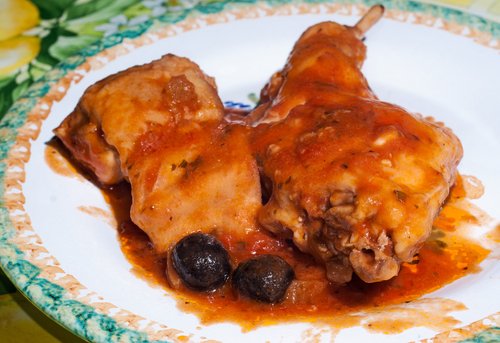The Best Ways to Cook Wild Rabbit
Exploring the Nutritional Benefits of Rabbit Meat: A Healthy Choice
When considering different types of meat for your diet, rabbit meat might not be the first option that comes to mind. However, rabbit meat has been a staple in various cultures and was widely consumed in the United States until the mid-20th century. It remains a nutritious and sustainable protein source, offering a unique alternative to more common meats like beef, pork, or chicken.
Discovering Rabbit Meat: A Culinary Delight
Rabbit meat, often overlooked, is a wholesome and sustainable source of protein that has nourished people during challenging times, such as the Great Depression. Despite their popularity as pets, rabbits also serve as a nutritious food source. This guide delves into the nutritional aspects of rabbit meat and offers tips on safe handling and preparation techniques.
Is Rabbit Meat Edible and Safe?
Globally, opinions on consuming rabbit meat vary, although it has been a part of human diets for ages. Rabbit meat is perfectly safe when properly cooked, similar to other meats. Ethical considerations arise, especially in regions where rabbits are commonly kept as pets. For those raising rabbits, providing them with a social environment is preferable, though this can be challenging for smaller farms.
Health Advantages and Considerations of Rabbit Meat
Pros: Rabbit meat is known for its mild taste, making it adaptable to various dishes like stews and stir-fries. As a lean protein source, it supports heart health without contributing to high cholesterol or heart disease.
Cons: The primary hesitation in consuming rabbit meat stems from psychological factors, particularly the notion of eating an animal often seen as a pet. Additionally, rabbit meat might not be readily available in all grocery stores, posing a challenge for those in urban areas.
Those living in rural settings might find it easier to source rabbit meat from local butchers or through hunting, though this requires knowledge of safe meat handling and storage.
Nutritional Profile of Rabbit Meat
Rabbit meat is an excellent source of protein, offering a healthier alternative with lower fat content than beef. A 100-gram serving of rabbit meat contains 29.1 grams of protein, essential for muscle, skin, hair, and nail health. It’s also rich in Vitamin B-12, crucial for red blood cell production and metabolism, and contains 38.5 micrograms of selenium per 100 grams, supporting the immune system and thyroid function.
Caloric Content of Rabbit Meat
A 100-gram serving of rabbit meat has 197 calories, comparable to lean beef cuts but significantly lower than fattier beef varieties.
Purchasing and Preparing Rabbit Meat Safely
While hunting for rabbit meat is an option, it’s also available in butcher shops, farmers’ markets, and some grocery stores. When buying or hunting rabbit meat, following proper guidelines for cleaning, cooking, and storing the meat is important to avoid foodborne illnesses.
Tips for Cooking and Storing Rabbit Meat
Cook rabbit meat using your preferred method, ensuring it reaches an internal temperature of 160°F. Store cooked leftovers in the refrigerator or freeze them for later use. If raw rabbit meat is frozen, thaw it safely in the refrigerator to prevent bacterial growth.
Enjoying Rabbit Meat in Your Diet
Rabbit meat is a versatile, lean, and heart-healthy option that can be creatively incorporated into various dishes. Its unique flavor and nutritional benefits make it a valuable addition to any diet.
Incorporating Rabbit Meat into Healthy Meals
Embrace the versatility of rabbit meat by experimenting with it in your favorite recipes. Whether you’re making a hearty stew, a savory soup, or a baked dish, rabbit meat can enhance your meals with its unique flavor and health benefits. It’s a lean protein that’s easy to cook and can be a delightful addition to a heart-healthy diet.
Creative Culinary Ideas with Rabbit Meat
Unleash your culinary creativity by using rabbit meat in various dishes. Its mild flavor makes it an excellent canvas for various seasonings and cooking styles. From roasting and braising to sautéing and baking, rabbit meat adapts well to different methods, allowing you to explore new and exciting flavors in your kitchen.
Sourcing and Selecting Quality Rabbit Meat
Explore your local grocery stores, farmers’ markets, and butcher shops for rabbit meat. Hunting rabbits might be a viable option for those in rural areas, but it requires knowledge of safe hunting practices and meat processing. Whether purchasing or hunting, select high-quality rabbit meat for the best culinary experience.
Understanding the Safe Handling of Rabbit Meat
Proper handling of rabbit meat is crucial to ensure safety and quality. If you choose to hunt, learn about gun safety and efficient methods of cleaning and processing the animal. When purchasing rabbit meat, inspect it for freshness and quality.
Maximizing the Nutritional Value of Rabbit Meat
To reap the full health benefits of rabbit meat, cook it to the appropriate internal temperature of 160°F using a meat thermometer. This ensures that the meat is safe while preserving its nutritional value.
Storing Rabbit Meat for Longevity
Proper storage is key to maintaining the quality of rabbit meat. Cooked rabbit meat can be refrigerated for a few days or frozen for extended periods. When freezing raw rabbit meat, avoid thawing it on the countertop or in hot water to prevent bacterial growth. Instead, let it defrost gradually in the refrigerator.
Enjoying Rabbit Meat as Part of a Balanced Diet
Incorporate rabbit meat into your diet as a lean, nutritious protein source. Its low-fat content and rich nutritional profile make it an excellent choice for those seeking a heart-healthy diet. Experiment with recipes and cooking methods to enjoy rabbit meat’s unique flavor and health benefits.
Through these considerations and creative culinary approaches, rabbit meat can become a regular and enjoyable part of your diet, offering flavor and nutritional advantages.








